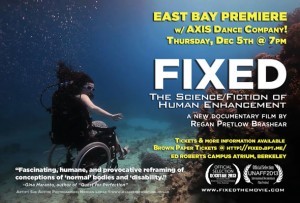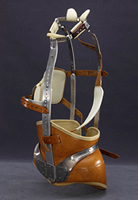 I’ve now seen Regan Brashear’s wonderfully thought-provoking documentary, Fixed: The Science/Fiction of Human Enhancement, twice, most recently, last night at the DREDF co-sponsored screening here at the Ed Roberts Campus. To my surprise, I’m accepting that I may well be “transhuman” or “The Six Million Dollar Co-Payment.”
I’ve now seen Regan Brashear’s wonderfully thought-provoking documentary, Fixed: The Science/Fiction of Human Enhancement, twice, most recently, last night at the DREDF co-sponsored screening here at the Ed Roberts Campus. To my surprise, I’m accepting that I may well be “transhuman” or “The Six Million Dollar Co-Payment.”
This is not to say the film didn’t make me very, very concerned. It did. Not about technology which, as someone in the film points out, can be viewed simply as the evolution of our tool-making ability. Technology itself doesn’t speak to the problem of how to responsibly distribute its benefits to the people who both need and want them. Some of the viewpoints in the film made me concerned about our collective capacity to enjoy technology’s benefits without allowing them to further stigmatize life with a disability. But this isn’t the first time that knowledge has outpaced ethics and it won’t be the last. Transhumanism doesn’t upgrade the human qualities of compassion, empathy, imagination, and fairness. But it could enhance my physical function and, for me, that would be useful in my ability to be a forceful advocate.
And the reality is that I have a lifelong history of enhancement, though that word wasn’t used.




I walk with the aid of orthotics and a walker, and am transitioning to using a wheelchair. I wear glasses. I’m starting to use Dragon. This morning, I availed myself of a heated car seat. I once used a Roomba and I’m dependent on a couple of little devices called a “phone” and a “light bulb.” To be honest, I don’t really get what “enhancement” means so to paraphrase Clairee Belcher in Steel Magnolias: “The only thing that makes me transhuman is my ability to accessorize.”
